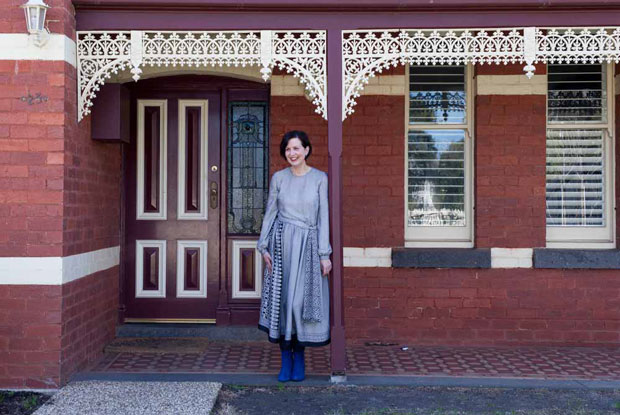By Sarah Tidey

Sarah Tidey is a freelance writer and former lawyer who was diagnosed with ovarian cancer in October 2015. She is currently having her fourth line of chemotherapy. She lives in Melbourne with her husband and three children aged 20, 18 and 16.
Whenever people find out I have ovarian cancer they often say two things:
1. 'but you look so well'
I’m never sure how to respond to this, although my vain streak lights up ever so slightly, like a contestant’s buzzer on a quiz show. Hooray, I have cancer but I look okay! Should I laugh and say, ‘I’d better double-check that diagnosis’? Or is it too heavy to explain that whilst I do look quite well I’m actually very unwell?
2. 'how did you find out?'
Many people see cancer as a life changing event, so it’s natural to want to pinpoint the moment at which you left the scenic terrain and stumbled into the abyss. Since being diagnosed with ovarian cancer a number of my friends said they have got themselves checked out, which is great. I’m happy to be a human hazard light – I hope that one of the good things to come out of my diagnosis is that I have made others more aware of the disease.
Ovarian cancer symptoms are fairly vague. Before my diagnosis, I was looking and feeling well with a few low grade symptoms that I had explained away with far nicer and less complicated diagnoses – a urinary tract infection (too much time in wet bathers on a recent holiday?), a sore lower back (too much stretching at yoga?), irregular periods (menopausal?).
Luckily, my doctor was thorough and sent me off to the gynaecologist who waved his ultrasound wand over my belly and commented that my ovaries looked very swollen. Then I had a gynaecological ultrasound which showed tumours, so I met with a surgeon that night. A week later, I left the hospital minus my entire reproductive system and my omentum (fatty tissue around my belly – perhaps not so bad to lose?) and sporting a scar any shark bite victim would be proud of.
My surgeon sat down with me and explained my diagnosis. High Grade Serous (the most common kind) of ovarian cancer (there are many kinds), Stage 3C (the cancer has spread beyond the ovaries). As a take home bonus, I had appointments for six rounds of chemotherapy.
the aftershock
Before I was diagnosed I’d never been to a fundraiser, bought a ribbon, or seen a TV story about someone with ovarian cancer. I was used to hearing about cancers that people were treated for and recovered from.
Like my diagnosis, I was shocked to learn that ovarian cancer is commonly diagnosed at the advanced stages because there is no test to detect the cancer early.
Or that less than 25% of women with my stage survive five years beyond diagnosis.
Perhaps the most shocking realisation was that ovarian cancer hasn’t attracted the same research and funding as other cancers.
I had never been in hospital, apart from when I gave birth. Very few people that I knew had been sick or died. I found it hard to accept (I still do) that I could be in either of those categories.
IN DREAMS, THERE IS HOPE
Ovarian cancer is a serious disease.
It’s one thing to learn that you have a cancer with a poor prognosis. It's another to learn that your prognosis was poor because not enough money is going towards the research that may help find an early detection test, better treatments or (I dream big) a cure.
As Australia’s #1 charity dedicated to funding ovarian cancer research, the Ovarian Cancer Research Foundation (OCRF) has been a really important part of giving hope to people who are living with the disease.
My advocacy and fundraising work with OCRF has helped me stay positive and determined to keep enjoying life.
While there is much work still to be done to improve the prognosis of this cancer, I‘ve been so grateful and encouraged by all the love and support from the local community involved in supporting this cause. With the OCRF alongside me, I feel hope that we can improve outcomes for this disease
The first step is getting that early detection test, which they are currently developing. They are also funding further research to find better treatments for those of us actually living with it.
Hope is a really important part of the story when you have cancer. It's what enables you to keep going.
Please help me make dreams a reality by supporting the OCRF.